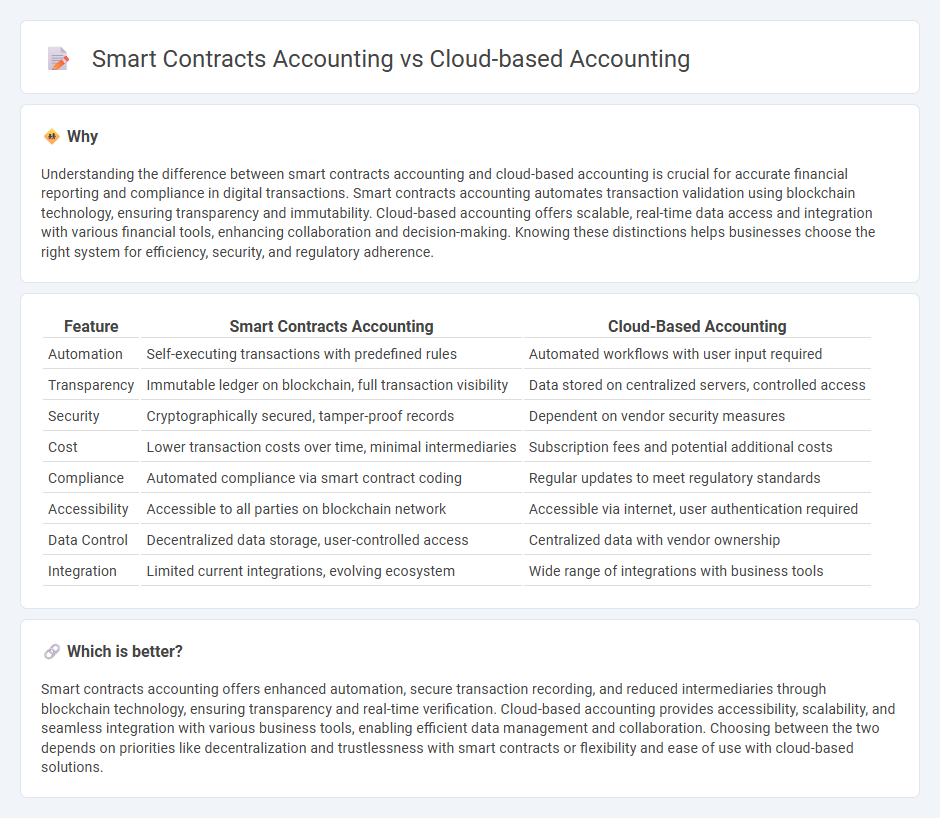
Smart contracts accounting leverages blockchain technology to automate and verify financial transactions with increased transparency and security, reducing the need for intermediaries. Cloud-based accounting offers scalable, real-time access to financial data via internet-connected platforms, enhancing collaboration and efficiency for businesses of all sizes. Explore the key differences and benefits of these innovative accounting solutions to optimize your financial management.
Why it is important
Understanding the difference between smart contracts accounting and cloud-based accounting is crucial for accurate financial reporting and compliance in digital transactions. Smart contracts accounting automates transaction validation using blockchain technology, ensuring transparency and immutability. Cloud-based accounting offers scalable, real-time data access and integration with various financial tools, enhancing collaboration and decision-making. Knowing these distinctions helps businesses choose the right system for efficiency, security, and regulatory adherence.
Comparison Table
| Feature | Smart Contracts Accounting | Cloud-Based Accounting |
|---|---|---|
| Automation | Self-executing transactions with predefined rules | Automated workflows with user input required |
| Transparency | Immutable ledger on blockchain, full transaction visibility | Data stored on centralized servers, controlled access |
| Security | Cryptographically secured, tamper-proof records | Dependent on vendor security measures |
| Cost | Lower transaction costs over time, minimal intermediaries | Subscription fees and potential additional costs |
| Compliance | Automated compliance via smart contract coding | Regular updates to meet regulatory standards |
| Accessibility | Accessible to all parties on blockchain network | Accessible via internet, user authentication required |
| Data Control | Decentralized data storage, user-controlled access | Centralized data with vendor ownership |
| Integration | Limited current integrations, evolving ecosystem | Wide range of integrations with business tools |
Which is better?
Smart contracts accounting offers enhanced automation, secure transaction recording, and reduced intermediaries through blockchain technology, ensuring transparency and real-time verification. Cloud-based accounting provides accessibility, scalability, and seamless integration with various business tools, enabling efficient data management and collaboration. Choosing between the two depends on priorities like decentralization and trustlessness with smart contracts or flexibility and ease of use with cloud-based solutions.
Connection
Smart contracts accounting automates transaction verification and record-keeping through blockchain technology, enhancing the accuracy and transparency of financial data. Cloud-based accounting platforms integrate smart contracts to streamline real-time data synchronization, ensuring seamless access and collaboration across multiple users and devices. This connection reduces manual errors, accelerates audit processes, and fosters secure, transparent financial management.
Key Terms
Data Accessibility
Cloud-based accounting offers real-time data access and seamless collaboration across multiple devices, empowering businesses to manage finances from anywhere with an internet connection. Smart contracts accounting enhances data integrity and security by automating transactions on blockchain, ensuring tamper-proof records and transparent audit trails. Explore the advantages and challenges of both technologies to optimize your financial data accessibility.
Automation
Cloud-based accounting leverages internet-hosted software to automate data entry, financial reporting, and real-time collaboration, reducing manual errors and increasing efficiency for businesses. Smart contract accounting utilizes blockchain technology to automate financial transactions and enforce contract terms through self-executing code, ensuring transparency and immutability in accounting processes. Explore how these automation advances can transform your financial operations and improve accuracy.
Transparency
Cloud-based accounting offers enhanced transparency through real-time access to financial data stored securely on remote servers, enabling stakeholders to monitor transactions anytime. Smart contracts accounting automates transaction validation using blockchain technology, ensuring immutable records that eliminate human errors and fraud. Discover how these technologies redefine transparency in financial management.
Source and External Links
Cloud Based Accounting: What is It and Why You Need It - Cloud-based accounting is hosted on remote servers using SaaS, offering flexibility, real-time updates, scalability, and cost efficiency while enabling access from multiple locations and devices for collaborative financial management.
Cloud Accounting: What It Is, How It Works And Its Benefits - Cloud accounting uses secure web-based software for streamlined business processes, allowing multiple users to access and collaborate on financial data from anywhere, improving efficiency and data security compared to traditional software.
How Cloud Computing Accounting Is Changing the Industry - Cloud computing in accounting enables real-time access and automation of financial tasks, enhances collaboration and workflow flexibility, and helps accounting firms demonstrate technological advancement to better serve clients.
 dowidth.com
dowidth.com